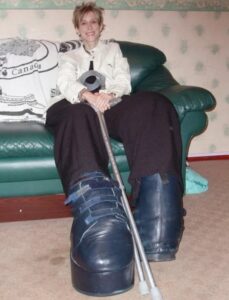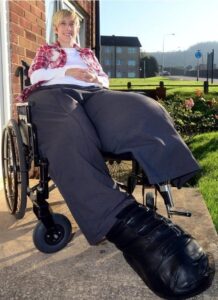
Greek mythology, the sea god Proteus was known for his ability to transform into various creatures. The rare and poorly understood condition named after him causes muscles, bones, skin, and blood vessels to grow to unimaginable sizes. Despite extensive research, no cure has been found, but doctors continue to explore ways to alleviate the suffering of those affected.

Globally, only 120 individuals have been diagnosed with Proteus syndrome, among them a resilient and upbeat British woman named Mandy Sellars.

At birth, Mandy showed no signs of her severe condition. She arrived in the world as a typical rosy, wrinkled baby, with slightly larger legs—a common variation among infants. However, as she grew, her legs began to outpace the rest of her body in both length and width. By age two, it was clear that her condition was far from normal. Doctors grew increasingly alarmed, predicting grim prospects for her survival. Her devoted parents took her to numerous medical facilities, but no progress was made in her treatment. Nevertheless, they created an environment where Mandy remained unaware of her differences from other children until adolescence.

At 19, Mandy decided she no longer wanted to be a burden on her family. She moved out, pursued a degree in psychology, and learned to navigate her apartment using a wheelchair. While her family remains close, ready to assist when needed, Mandy manages her daily tasks independently. Unfortunately, Proteus syndrome tends to progress over time. At 28, Mandy suffered severe thrombosis that left her paralyzed. It took two months for her to regain mobility.

The series producers funded her trip to the U.S. for consultations with renowned orthopedic surgeon William Ertl and prosthetics expert Kevin Carroll. The examination revealed that only part of her left leg needed amputation. Two years later, her leg began to grow back to its previous size, breaking the prosthesis. Mandy’s treatment continues, and if doctors can halt the growth, it would mark a significant breakthrough in medical science.





